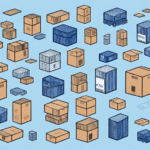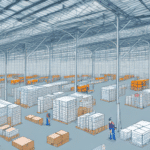An Overview and Features of 3PL Logistics Fulfillment
Managing logistics is a critical component of running a successful e-commerce business. Challenges such as inventory management, order processing, and ensuring timely delivery can be overwhelming, especially for small businesses and startups with limited resources. This is where Third-Party Logistics (3PL) fulfillment becomes invaluable. This article provides an in-depth analysis of 3PL logistics solutions, exploring their benefits, challenges, and how to choose the right provider to align with your business needs.
What is Third-Party Logistics (3PL) Fulfillment?
Third-Party Logistics (3PL) refers to the outsourcing of various logistics functions to specialized providers. These 3PL providers handle everything from warehousing and inventory management to order picking, packing, and shipping. By delegating these tasks, businesses can focus on their core activities such as product development and marketing.
One of the primary advantages of utilizing a 3PL provider is access to advanced technologies and resources that individual businesses might not afford on their own. This leads to increased operational efficiency and significant cost savings. Additionally, 3PL fulfillment offers scalability, allowing businesses to adjust their logistics operations based on demand without the need for substantial investments in infrastructure.
Advantages of Using 3PL Fulfillment Services
- Cost Savings: Outsourcing logistics eliminates expenses related to warehousing, labor, and infrastructure, enabling businesses to allocate resources more effectively.
- Increased Efficiency: 3PL providers leverage their expertise and technology to enhance the speed and accuracy of order fulfillment, reducing errors and delays.
- Scalability: As your business grows, 3PL providers can seamlessly scale operations to meet increasing demands without the need for additional warehouse space or staff.
- Access to Advanced Technology: Many 3PL providers offer sophisticated inventory management systems, order tracking software, and automated shipping solutions that enhance overall logistics performance.
- Focus on Core Competencies: By outsourcing logistics, businesses can concentrate on product innovation, marketing, and customer service, driving growth and competitiveness.
Types of 3PL Providers and Their Services
3PL providers offer a range of specialized services tailored to different business needs. The most common types include:
- Warehouse/Distribution Centers: These providers specialize in storing and managing inventory, fulfilling orders, and may offer additional services like kitting and assembly.
- Freight Forwarders: They manage the transportation of goods between locations, including international shipping, ensuring that products reach their destinations efficiently.
- Courier and Delivery Providers: Focused on ground shipping and direct-to-consumer deliveries, these providers often offer specialized services such as same-day or next-day delivery.
- Value-Added Service Providers: These providers offer additional logistics services, including packaging, labeling, and quality control inspections, enhancing the overall supply chain process.
Many 3PL providers also specialize in specific industries or handle specialized goods like hazardous materials or perishable items. Additionally, they offer technology solutions like inventory management software or transportation management systems to streamline logistics operations.
How 3PL Providers Help Streamline Supply Chain Management
Outsourcing logistics functions to a 3PL provider enables businesses to achieve more efficient supply chain management. A 3PL provider manages everything from sourcing and procurement to warehousing, order fulfillment, and shipping. This comprehensive management allows businesses to focus on their strengths while leaving logistics to experts.
3PL providers utilize advanced technologies such as Inventory Management Systems (IMS), Transportation Management Systems (TMS), and Warehouse Management Systems (WMS) to optimize supply chain operations. These tools enhance efficiency, reduce costs, and improve visibility throughout the supply chain.
Furthermore, 3PL providers offer flexibility, allowing businesses to scale their logistics operations up or down based on demand. This adaptability is crucial for responding to market fluctuations and evolving customer expectations without significant investments in additional resources or infrastructure.
Key Factors to Consider When Choosing a 3PL Provider
Selecting the right 3PL provider is a critical decision that can significantly impact your business’s success. Here are key factors to consider:
- Experience and Expertise: Choose a provider with experience in your industry and with similar product types to ensure they understand your specific logistics needs.
- Technology and Integration Capabilities: Ensure the provider’s technology can integrate seamlessly with your existing systems, facilitating smooth operations and data exchange.
- Flexibility and Scalability: Select a provider that can grow with your business and adapt to changing needs, ensuring long-term support as your business evolves.
- Location and Shipping Capabilities: Consider the provider’s geographic locations in relation to your customer base and shipping requirements to minimize delivery times and costs.
- Cost and Pricing Structure: Evaluate the provider’s pricing to ensure it aligns with your budget and financial goals, looking for transparent pricing without hidden fees.
- Customer Service and Communication: Opt for a provider that offers responsive and effective communication channels to address any issues promptly.
- Sustainability Practices: If sustainability is a priority, choose a provider committed to environmentally responsible practices, such as using eco-friendly packaging or optimizing delivery routes to reduce carbon emissions.
Understanding the Role of Technology in 3PL Fulfillment
Technology is a cornerstone of effective 3PL fulfillment. Modern 3PL providers utilize advanced solutions such as Warehouse Management Systems (WMS), Transportation Management Systems (TMS), and Order Management Systems (OMS) to enhance logistics processes and streamline supply chain management.
Key benefits of technology in 3PL fulfillment include:
- Increased Efficiency: Automated processes and real-time data allow 3PL providers to swiftly identify and resolve supply chain issues, reducing errors and delays.
- Enhanced Visibility: Real-time tracking and reporting on inventory levels, order status, and shipping updates improve transparency and decision-making.
- Improved Customer Service: Real-time updates and accurate tracking information enhance the customer experience, fostering trust and loyalty.
According to a 2023 report by Supply Chain Digital, businesses leveraging advanced 3PL technologies experience a 20% increase in operational efficiency and a 15% reduction in logistics costs.
Challenges and Solutions for Effective 3PL Management
While 3PL fulfillment offers numerous benefits, it also presents certain challenges that businesses must navigate:
Communication and Integration Issues
Effective communication and seamless integration with your existing systems are crucial. To address this, establish clear communication channels and set mutual goals with your 3PL provider. Additionally, choose a provider with robust integration capabilities to ensure smooth operations.
Cost Management
Outsourcing logistics can lead to initial setup costs and potential ongoing fees. To mitigate these expenses, thoroughly evaluate potential providers, negotiate pricing terms, and ensure there are no hidden costs. Transparent pricing structures help in maintaining budget alignment.
Transparency and Visibility
Maintaining transparency into your supply chain is essential for informed decision-making. Select a 3PL provider that offers comprehensive tracking and reporting capabilities, enabling you to monitor inventory levels, order statuses, and shipment progress in real time.
Measuring Performance and Success in 3PL Fulfillment
To assess the effectiveness of your 3PL fulfillment strategy, track key performance indicators (KPIs) such as:
- Order Accuracy Rates: The percentage of orders fulfilled correctly.
- Order Processing Times: The average time taken to process and fulfill an order.
- Shipping Times: The duration from order placement to delivery.
- Inventory Accuracy: The accuracy of inventory records compared to actual stock levels.
Regularly reviewing these KPIs with your 3PL provider can help identify areas for improvement and optimize your logistics strategy. Additionally, incorporating customer feedback through satisfaction surveys provides valuable insights into the customer experience, highlighting areas such as shipping speed and order accuracy.
Case Studies: Successful Implementations of 3PL Logistics Fulfillment
Many businesses have successfully leveraged 3PL logistics fulfillment to enhance their operations. Here are a few notable examples:
- Zappos: This online shoe retailer outsourced its entire fulfillment and logistics operations to a 3PL provider, enabling the company to focus on its core strengths of customer service and product selection.
- Walmart: Walmart collaborates with multiple 3PL providers to manage its extensive supply chain, ensuring timely and accurate delivery of products to its stores and customers worldwide.
- Sephora: The beauty retailer implemented a 3PL solution featuring real-time inventory and order tracking, along with automated picking and packing processes, significantly speeding up order fulfillment.
Future Trends and Innovations in the 3PL Industry
The 3PL logistics industry is continually evolving, with new technologies and innovations shaping its future. Key trends include:
- Automation: The adoption of robotics and artificial intelligence to optimize logistics operations and enhance efficiency.
- E-commerce Integration: Developing integrated solutions for online retailers, including real-time inventory management and direct-to-consumer delivery options.
- Green Logistics: Implementing sustainable practices to reduce carbon emissions and minimize waste, aligning with increasing environmental responsibilities.
- Blockchain Technology: Utilizing blockchain for enhanced security and transparency in supply chain management, ensuring data integrity and traceability.
According to a 2023 report by the Forbes Technology Council, the integration of AI and blockchain is expected to revolutionize supply chain transparency and operational efficiency, driving significant advancements in the 3PL sector.
Conclusion: Is Outsourcing Your Logistics Needs Right for Your Business?
3PL logistics fulfillment offers a strategic solution for businesses looking to streamline their supply chain management and enhance operational efficiency. By outsourcing logistics functions, businesses can focus on their core competencies while leveraging the expertise and advanced technologies of 3PL providers. However, it's essential to carefully evaluate the benefits and challenges of outsourcing logistics and select a provider that aligns with your specific business needs. With the right strategy and partnership, 3PL logistics fulfillment can drive your business to new heights.








